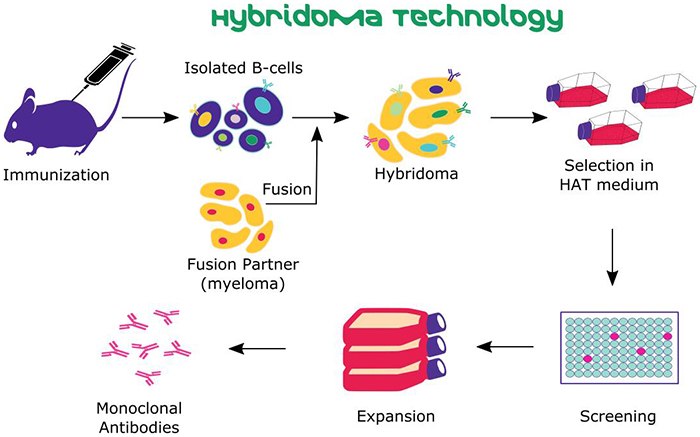Hybridoma Fusion Partners Cell Lines
Hybridoma Cell Technology
Hybridoma technology involves the production of monoclonal antibodies specific to an antigen of interest. The somatic fusion of B lymphocytes of the spleen with immortal myeloma cells gives rise to a hybridoma cell line that can be perpetually propagated to produce clonally identical antibodies, as these hybridoma cells inherit the indefinite growth properties of myeloma cells and the antibody secretion capabilities of B-lymphocytes. Monoclonal antibodies produced by a unique hybridoma cell line are homogeneous and recognize a single epitope of an antigen.
Monoclonal antibodies produced from hybridoma technology are used in the following applications:
- Biochemical analysis: Monoclonal antibodies revolutionized laboratory diagnosis. Antibodies are routinely used in biochemical analysis (RIA, ELISA), immunohistopathology, and diagnostic imaging (immunoscintigraphy).
- Immunotherapy: Human, humanized, or chimeric monoclonal antibodies are used in the treatment of cancer, autoimmune diseases, infectious diseases, cardiovascular and other non-oncological treatments, as an adjunct to organ transplantation, and for targeted drug delivery.
- Protein purification: Monoclonal antibodies are used to purify proteins and are especially useful for the purification of recombinant proteins (immunoaffinity chromatography).
- Browse our collection of over 400 monoclonal antibody secreting hybridoma cell lines.

Selection of the optimal immortal cell line is critical for achieving the desired attributes of the hybridoma. Lack of suitable fusion partners hampers the applicability of monoclonal antibodies in research and immunotherapy. For example, the application of xenogeneic monoclonal antibodies in therapy and in vivo diagnostics often results in an undesirable human anti-mouse antibody (HAMA) response.
Our selection of fusion partner cell lines include serum- and animal component-free propagation options. Choose from dozens of options to find the optimal fusion partner for your application and increase the efficiency of hybridoma growth and antibody synthesis.
To continue reading please sign in or create an account.
Don't Have An Account?